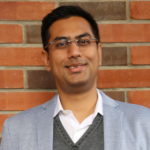GKII Announces Breakthrough Grant Awardees for Health Data Research
The Gupta-Klinsky India Institute is pleased to announce the Fall 2023 awardees for GKII’s Breakthrough Research Grants Program! The Breakthrough Research Grants Program is designed to support JHU faculty pilot projects involving interdisciplinary collaborations with India-based research institutes.
This exciting collaboration with Ashoka University is focused on the field of Health Data Research. Two teams were selected, each with a lead PI from both Johns Hopkins University and Ashoka University. This grant challenge awards $60,000 to each winning proposal for 18 months.
Of the many esteemed applications for this cycle, the following projects were selected. Congratulations to the following recipients!
 Steven Clipman, Assistant Professor of Medicine, Division of Infectious Diseases, Johns Hopkins School of Medicine
Steven Clipman, Assistant Professor of Medicine, Division of Infectious Diseases, Johns Hopkins School of Medicine
 Debayan Gupta, Assistant Professor of Computer Science, Ashoka University
Debayan Gupta, Assistant Professor of Computer Science, Ashoka University
Project: Machine Learning Methods for Enhanced Forecasting of Antiretroviral Therapy Demand in India
The primary objective of this project is to develop and implement a machine learning-based model to enhance the prediction of antiretroviral therapy demand in India. The model aims to improve the accuracy of demand forecasting, contributing to effective supply chain management and ensuring the continuity of treatment for people living with HIV. They will validate the machine learning model using historical data and compare its performance with current methods. They will also develop a user-friendly interface for healthcare administrators to use the predictive model.
“Ensuring a consistent supply of medication for people living with HIV is a complex but essential task, requiring accurate forecasting of demand to avoid stockouts.” Dr. Clipman said. “By harnessing the power of machine learning through this GKII breakthrough grant, we aim to refine methods for ART demand forecasting to ensure consistent treatment availability for millions of people living with HIV in India and establish a scalable model that could improve supply chain and healthcare delivery systems globally.”
 Matthew Robinson, Assistant Professor, Division of Infectious Diseases, Johns Hopkins School of Medicine
Matthew Robinson, Assistant Professor, Division of Infectious Diseases, Johns Hopkins School of Medicine
 Rintu Kutum, Faculty Fellow of Computer Science, Ashoka University
Rintu Kutum, Faculty Fellow of Computer Science, Ashoka University
Project: Leveraging language models and a common data model to unlock real world evidence from unstructured electronic health record data in India
Drs. Robinson and Kutum plan to develop natural language processing algorithms and leverage open-source large language models tailored to the Indian context to extract and transform clinical features from unstructured clinical notes into the Observational Medical Outcomes Partnership Common Data Model. They will determine the prevalence and choice of antibiotic prescription among outpatients with febrile respiratory illness in India and the US and assess the impact of antibiotic choice on treatment outcomes for inpatients with carbapenem-resistant organism pneumonia in India and the US.
“We are so delighted to be recipients of the GKII-Ashoka Breakthrough Research Grant. As developments in AI are outpacing the ability for medical researchers to comprehend them, we are excited to harness new AI-driven tools to unlock meaning in repositories of clinical notes to advance observational health research,” Dr. Robinson said. “We will apply modern natural language processing and large language model techniques to understand how clinicians in India and the US prescribe antibiotics with hope that these findings will inform efforts to use antibiotics more judiciously and effectively.”
“Leveraging natural language processing tools and open-source large language models, we can accelerate the conversion of unstructured digitized health data in India into open community data standards format like Observational Medical Outcome Partnership – Common Data Model. This will in turn help us to mitigate interoperability issues and ease in generating real-world evidence from the standardized health data,” Dr. Kutum said. “This grant will foster the collective exchange of expertise in the field of AI and Health Informatics leading towards the understanding of, the landscape of antibiotics (prescriptions and usages) in a specific condition as a pilot observational study.”